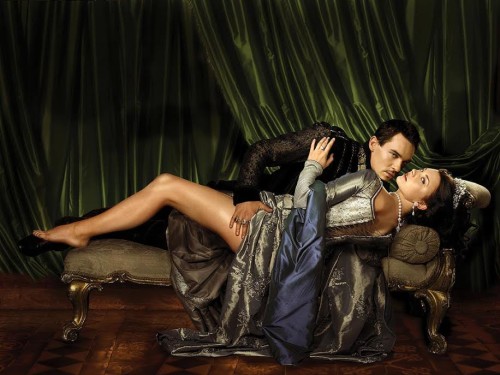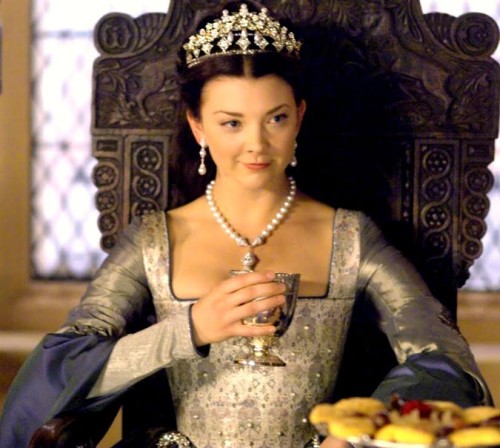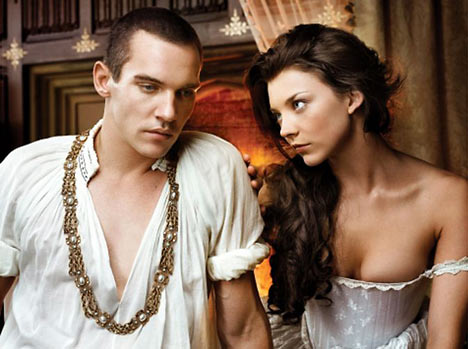This guest post by Emma Kat Richardson appears as part of our theme week on Unlikable Women.
“Write me letters and poems. Ravish me with your words. Seduce me.”
These words, spoken by Anne Boleyn to Henry VIII, are an arrow dipped in love potion, shot through the king’s heart – a direct command from the courtly lady he might worship and serve. From then on, Henry will stop at nothing to have her; and the consequences of this maddening obsession will go on to tear England nearly asunder with the initiation of the Reformation. That’s… quite a bit of exposition for a mere poetry request. How, exactly, did this ordinary woman of average background and breeding manage to ensnare one of the most powerful men in Christendom? With as much information as is publicly available on these grand historical events, it’s hard to say with certainty what Anne really did to pull off such an unprecedented feat. What we can say for sure is that these words never make an appearance in any textbook or scholarly treatise on the discarded queens of England’s eccentric eighth King Henry; rather, they are a snippet of sensationalistic dialogue accorded to Anne as portrayed in Showtime’s epic, sexed up costume drama, The Tudors.

But first, before we dive into the realm of heaving bosoms and salacious, soapy one-liners, a little historical background: as the second wife of England’s first Renaissance king, Henry VIII, Anne Boleyn was considered by many contemporaries to be the very living, breathing definition of an unlikable woman. And perhaps “unlikable” is too soft a term here – at points in the 16th century, following her execution on trumped up charges of adultery and treason, Anne was so widely reviled that very few of her own words, actions, or even accurate portraits remain today, thanks to Henry’s redoubtable efforts to wipe her off the record completely. Her unpopularity with the public stemmed mostly from the fact that Henry had moved heaven and earth (almost literally, since he all but kicked the national religion of Catholicism out of England just to have her) to divorce his first wife and marry Anne in her place. That first wife, Catherine of Aragon, had been a Spanish princess whose marriage of almost two decades to Henry had produced one daughter but no living sons to inherit the crown. With the royal succession dangerously in jeopardy, Henry began casting about for a way out of his marriage, and “Mistress Boleyn,” as she was then known, was more than ready to provide not only the ends but the means to Henry’s little marital dilemma as well. A committed reformer, Anne was a vocal advocate for reforming the abuses of the clergy and papacy, and even today is widely regarded as being responsible for England’s violent split with Rome and the “old faith.”
So, clearly, she was a little bit controversial. The whole home-wrecking aspect didn’t do much to bolster Anne’s personal approval ratings, either. But, especially as she’s played by Natalie Dormer on The Tudors, it’s impossible to deny that there’s just something about Annie. She’s easy to hate, in patches, but one who manages to be both polarizing and magnetic; indeed, Dormer’s Anne is a quick-witted, razor sharp intellectual with enough sex appeal drive a wedge not only between Henry and his wife, but Henry and his mistress, Anne’s own sister Mary.

Many recent portrayals of Anne depict her as utterly ruthless and oozing with ambition – the appallingly bad screen 2008 adaptation of Philippa Gregory’s novel The Other Boleyn Girl springs immediately to mind. But Dormer’s Anne is more coy and calculating than toxic and reckless. In early episodes of the series, while Jonathan Rhys Meyers’ Abecrombie-ized Henry is flitting from one court lady’s bed to another, it is difficult to know Anne’s thoughts as her family arranges for her own physical entrapment of the king. Dormer plays Anne as cool and aloof – so much so that the show nearly refrains from giving Anne a perspective at all in the nascent days of her courtship with Henry. Whether Anne is fending off his sexual advances for strategy, as her scenes with her family patriarchs suggest, or if she has legitimate concerns about her maidenly reputation is anyone’s guess; however, once it becomes clear that Henry has his hose in a bunch at the prospect of bedding Anne, the proverbial gloves come off, and, eventually, so do Anne’s gowns.
Not that Dormer’s Anne is without her moments of pure malice, of course. As supreme seductress of the king, Anne, riding high on ego and self-confidence, boldly spars with the queen, her rival. “I care nothing for Catherine,” she declares haughtily in the first season’s finale. “I would rather see her hanged than acknowledge her as my mistress.” On another occasion, Anne viciously tears in to Henry after she discovers that Catherine is still sewing his shirts; a truly intimate betrayal in 16th century terms. And, in the face of so much antipathy toward her presence, she even changes her public motto to, roughly translated, “this is how it’s going to be; let them grumble”!

But really, what lies beyond Dormer’s ability to fill Anne with fire is her careful attention to the qualities that render Anne sympathetic, too. During the show’s first season, Dormer reportedly fought with Showtime’s producers to transform Anne into more of a reformist intellectual and less of an overheated sexpot. As she told Susan Bordo in The Creation of Anne Boleyn, Bordo’s probe into the continued cultural relevance of Anne: “Men still have trouble recognizing that a woman can be complex, can have ambition, good looks, sexuality, erudition, and common sense. A woman can have all those facets, and yet men, in literature and in drama, seem to need to simplify women, to polarize us as either the whore or the angel. That sensibility is prevalent, even to this day. I have a lot of respect for Michael [Hirst, creator of The Tudors], as a writer and a human being, but I think that he has that tendency. I don’t think he does it consciously. I think it’s something innate that just happens and he doesn’t realize it.” By the show’s second season, Dormer’s Anne had made the leap from elaborately dressed cock-tease to a fully formed, charismatic and courageous individual. Her execution in the season two finale saw an 83 percent spike in viewership over the first season’s finale episode, and once Dormer left the show, ratings dropped drastically.
Just as with the real Anne Boleyn, who once ruled over the kingdom of England and its monarch’s fickle heartstrings, Dormer’s Boleyn may have an unlikeable surface, but she’s so much more than a mere strumpet with a couple of decent lines. Right down to her alluring smile as she reads from the holy Scripture aloud in English, Dormer has created an Anne for all seasons: the very embodiment of just how complex and riveting she must have been during her all-too short life.
[youtube_sc url=”https://www.youtube.com/watch?v=i6-ThCEeTJU”]
Emma Kat Richardson is a Detroit native and freelance writer living in Austin, Texas. Her work has appeared in xoJane.com, Bitch, Alternative Press, LaughSpin.com, Real Detroit Weekly, 944, and Bust.com. She’s enough of a comedy nerd and cat lady to have named her Maine Coon Michael Ian Cat. Follow her on twitter: @emmakat.

